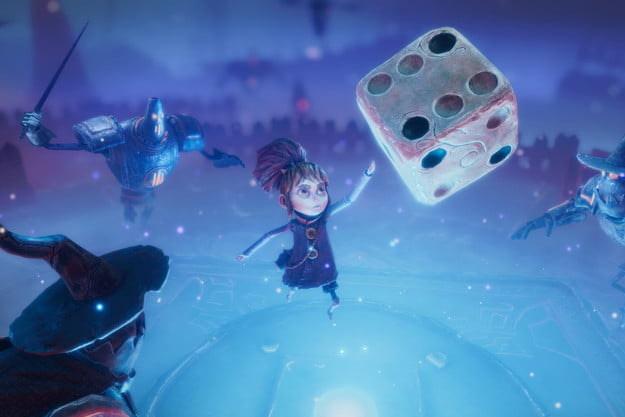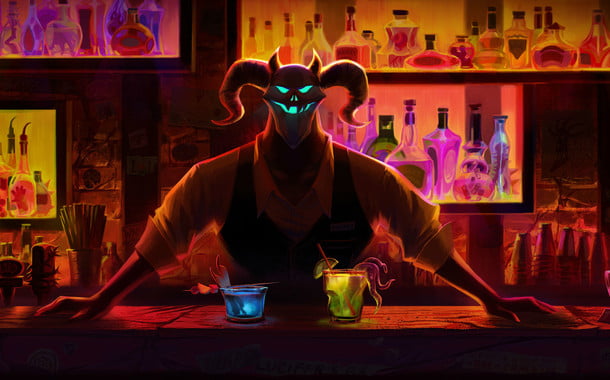Lost in Random Review: A Soulslike in a Charming Disguise

Lost in Random Review: Don't let the adorable exterior of this Soulslike fool you
"Lost in Random is like a living storybook, but that's not enough to get it through its struggles."
advantages
-
Fine art and animation
-
Great characters
-
Interesting central secret
-
Occasionally satisfying fight
disadvantage
-
Frustrating struggle
-
Too much dialogue
-
Lots of bugs
It's late, it's dark and I'm lost. I run through the streets of Threedom chasing a ghost I'm not even sure it's real. Strange, twisted creatures call out to me along the way, promoting their wares and warning me not to wander too far. I shut her out as I run, determined to save my sister – and maybe end Threedom's eternal civil war while I'm at it. The whole time a monster is whispering in my ear, reminding me that I only have until sunset or that my search will be in vain.
This is the world of Lost in Random, the latest project from the Swedish studio Zoink Games. Released by Thunderful Games as part of the EA Originals program, Lost in Random is an indie action-adventure game with a distinctive Tim Burton-like aesthetic. In the world of random, the fortunes of the citizens are decided by throwing a six-sided die. A mad queen rules the six kingdoms of the world, each with a unique number as its theme. When children turn 12, the queen rolls the die and the number she lands on determines which kingdom they are sent to. The main character Even was born to the inhabitants of Onecroft, the lowest and most unfortunate kingdom. When Even's beloved sister Odd rolls a six on her birthday and is taken to the Queen's palace, Even sets out to find her. On the way she meets Dicey, a sentient cube with a surprising amount of power. Armed with Dicey and a deck of cards, Even sets out to save Odd.
Lost in Random is a lush, beautiful adventure through an interesting world full of unique characters. At the same time, it's also a tough action game with relatively limited resources and a strong focus on evasion mechanics. The more I played, the more I felt like this wasn't your average action-adventure game – instead, it's actually soulslike in disguise, or a game that takes its fighting cues from the infamous Dark Souls series. Unfortunately, this reveal came with all of the frustration Soulslikes bring with it.
Places to go, meet people
The best thing about Lost in Random is its world. Every setting is a feast for the eyes, from the strange teapot-shaped buildings of Onecroft to the majestic pink sunset of Threedom. Each area has its share of strange, disturbing characters, many of which have a story to tell. Playing the game really made me feel like I was back in my childhood. Many of the designs are based on creatures that rumble at night, the monsters under your bed that your picture books have warned you about.
The central search is so mysterious and interesting that it kept bothering me. Combined with strong voice acting and narration, the overall package is just creepy and adorable enough that I was always curious to see what I would discover in each new kingdom. I especially liked the short sections with Odd which are creative and gorgeous in the best possible way.
As fun as it is to hear the story of each random resident, the dialogues get a little boring at times. Many of the characters are extremely lengthy and speak exceptionally slowly. After a while I found myself struggling through the dialogues, desperate to just get to the point. I also found a couple of audio bugs that resulted in dialogs being skipped or not playing.
The whole package is just creepy and adorable enough that I was always curious to see what I would discover in each new kingdom.
Even so, the game's writing style is strong and each character feels unique. There are more dialogue options than you'd expect, though they're more about taste and color than about real decisions. Even often, she has a variety of snappy responses available, and I enjoyed hearing the characters' responses to their derogatory comments.

The only downside to the environments is the difficulty of traversing them. Every street looks similar after a while and the game's map is mostly useless. (It urgently needs a "You are here" token.) The angular nature of battle arenas resulted in my getting stuck on walls quite often in fights, making it impossible for me to dodge enemy attacks. The camera often gets caught behind walls and structures in these arenas too, especially if you throw Dicey near a wall.
Random rules
Lost in Randoms linear exploration and conversation simulator segments are broken up by arena-style battles. After even leaving Onecroft and meeting Dicey, she often finds herself in small, vaguely circular areas with a group of enemies that she must fight. In any battle, the battle begins with a relative impotence: even dodging enemy attacks and using their slingshot to remove crystals from the bodies of enemies. Once she has collected enough crystals, she can throw Dicey to roll a number and stop the flow of time. The number determines which cards from her hand she can use. Each card is assigned a number and an effect, such as making a potion that heals even or takes the form of a sword so that it can defend itself. After making your selection, you can manually restart the time and fight back.

The whole process feels clunky (especially at the beginning when Dicey can only roll one or two, which limits resources), but it's definitely unique. Even if you have the opportunity to fight back, the game focuses more on precise dodging and mobility than a sense of power. Even's sprint doesn't go very far, but jumping right in front of an enemy attacking grants an extra thrust that propels them further and allows players to turn around and strike while an enemy has their backs on their backs. Timing it right is extremely satisfying, and the game rewards players for luring enemies into other enemies' attacks as they can and will harm each other if they try to reach Even.
Like the dialogues, many of the battles just go on for way too long, which makes it frustrating as you near the end and get knocked out by an enemy spear for dodging the wrong way.
I wish there was a greater variety of cards – I've been using the same ones over and over, and the game's card vendor usually just gives players the option to buy more of what they have. There is also a lack of hostile diversity; By halfway through the game I had only seen four different guys. There are a handful of board game style fights that shake up the combat environments a bit, but they don't add anything particularly interesting to the game.
The arenas themselves can be frustrating. Most of them are circular, which makes it easier to drag enemies around and give room to dodge, but they're still angular enough that I often crashed into walls and other objects and got trapped. The difficulty level increases pretty quickly and the sheer number of enemies in some arenas can make battles a slow blow.
Like the dialogues, many of the battles just go on for way too long, which makes it frustrating as you near the end and get knocked out by an enemy spear for dodging the wrong way. That's the nature of a soul-like.
Choose your poison
Aside from design issues, I've encountered a surprising number of bugs during my time playing the game. Aside from the audio issues mentioned above, every time I started the game, I kept getting “Controller not found” message. I was playing on the pc so it was a strange message to get. I also encountered a breakthrough bug and crash that required me to restart the game to continue. Lost in random autosaves, so it wasn't too big a deal either way, but experiences like this drive the frustration factor higher than it should be. The game will receive a day-one patch at launch that will hopefully fix some of these more egregious issues.

Although my review key was for the PC, I would undeniably recommend playing the game with a controller or on a console. There are some very weird default key bindings, and the game felt both too tricky and clunky with the mouse and keyboard. Soulslikes are traditionally best played with a controller, and this game definitely belongs to this group.
Our opinion
Lost in Random is like a living storybook, but that's not enough to carry it through its struggles. I said to myself, I wish a lot: I wish there was more variety of opponents and cards. I wish there weren't that many mistakes. I wish the dialogue wasn't so lengthy. The game has so much promise and succeeds in many things it imagines, but its shortcomings are too numerous and too great to prevent a six.
How long it will take?
The main story itself lasts around 20 hours, although there are plenty of side quests for dedicated players. There are a few collectibles to be found too, so completeers will have a reason to extend their gaming session. The story is linear and unique, so there's no need to replay it.
Is there an alternative?
Players looking for even more hardcore experience should check out the Dark Souls and Bloodborne franchises for a cleaner, more straightforward version of this fighting style. Although it's pretty old at this point, the hack-and-slash game Alice: Madness Returns has a similar visual aesthetic that feels "more grown-up" than Lost in Random.
Should you buy it?
Yes – if you're a gamer who loves storybook-style adventures and conversational games, then you should check out Lost in Random. (For those who just want to see the story, the game's difficulty level can be reduced.) It's also worth a look for players looking to dip their toes in Soulslike games. Everyone else can probably skip it.
Lost in Random is available now for PC, Nintendo Switch, PlayStation 4, PS5, Xbox One and Series X / S.
Editor's recommendations




